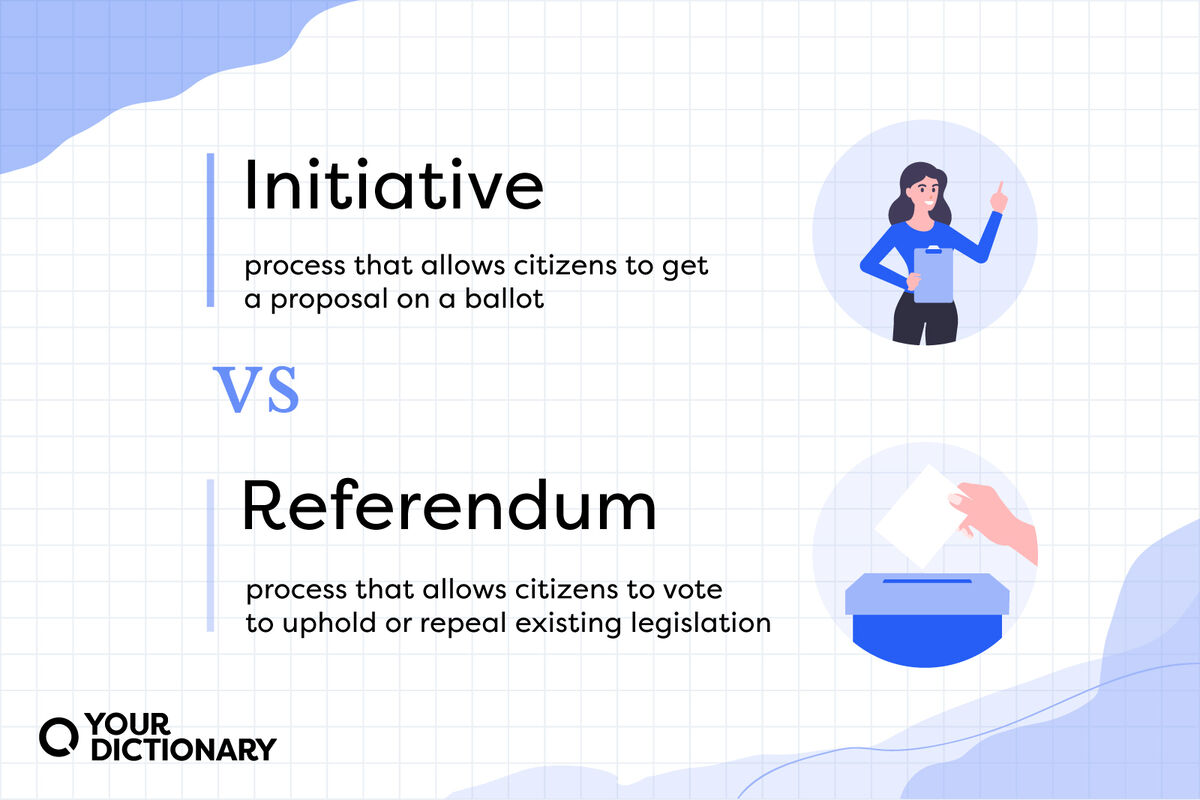
When you get your ballot, you’ll probably see a bunch of names for all the candidates up for election. Alongside those names, you might encounter a variety of other things to vote on. Proposals? It’s okay, we’re not talking about marriage here, but it’s worth knowing about proposals, especially initiatives and referendums.
What Does “Proposal” Mean?
When most people hear proposal, they probably think about wedding bells, gowns, and vows that leave you a sobbing mess. In this sense, proposal means “an offer of marriage.”
However, proposal also has a more general meaning beyond brides and grooms. Proposal means “an offering or suggestion put forward for consideration, acceptance, or discussion.” That meaning extends to ballots. Think of a proposal as a suggestion to enact a new law, amend existing laws, or repeal laws.
What Does “Initiative” Mean?
Initiative is a noun with a few different meanings. In general, initiative most commonly refers to “the ability to take charge before others do.”
- She had the initiative to order a pizza before anyone even arrived at the party.
- My manager appreciated how I showed initiative by completing all my tasks beforehand.
In U.S. politics, an initiative is “the process that allows everyday citizens to propose a potential piece of legislation.” There are obviously a lot of little nuances based on the municipality and level of government, but you’ll typically find two different types of initiatives.
- Indirect initiative - Citizens collect signatures, after which the state or local government considers the measure to either adopt or put on a ballot.
- Direct initiative - Citizens draft a proposal that goes directly onto the ballot.
Word Origins of “Initiative”
Initiative comes directly from the French word initiative. This derives from the Latin word initiatus, the past participle form of initiare, meaning “to begin.”
A Real Example of an Initiative
In 2014, the Oregon ballot featured Measure 91, the Oregon Legalized Marijuana Initiative. This chief petitioner was Anthony Johnson, the director of New Approach Oregon. It was approved on the ballot, making way for legalized recreational marijuana usage for people age 21 and older.
What Does “Referendum” Mean?
Referendum initially meant “a proposed law that was then referred to other parties for sanction or approval.” The modern idea in U.S. politics is that citizens are voting on a policy initially proposed by a politician or lawmaker.
- The state made a decision by referendum to give everyone a free weekly pizza.
- The class voted by referendum to change the teacher’s policy on chewing gum in class.
Word Origins of “Referendum”
Referendum comes to us directly from the classical Latin word referendum, meaning “that which must be referred” but more literally meaning “something brought back.” This is the gerund form of referre, meaning “to take or bring back.”
A Real Example of a Referendum
Referendums are historically pretty boring, largely having to do with changes to taxes and redistricting, but they’ve still played important roles in historical policy. For example, the Washington Same-Sex Marriage Referendum (also known as Referendum 74) was approved in the 2012 election, legalizing same-sex marriage in Washington.
Types of Referendums
For a little extra confusion, referendums come in a few different types. But don’t worry, the same general idea still applies (citizens voting on policies proposed by anyone other than a citizen).
Legislative Referendums
That general idea most closely applies to legislative referendums in U.S. politics. The legislative referendum process allows you and other thoughtful, well-read citizens to vote on a ballot measure that originated from the state or local legislature.
Veto Referendum
Referendum can also refer to veto referendum, which refers to a citizen-initiated ballot measure (much like an initiative). With a veto referendum, citizens collect signatures to either uphold or repeal existing legislation, and if they get enough, the matter goes up for vote on the ballot.
Although a veto referendum is still initiated by citizens, the key here is whether the proposed policy already exists or not. If it’s a change to an existing policy from a lawmaker, it’s a veto referendum; if it’s an all-new, fresh-out-of-the-oven policy from a citizen, it’s an initiative.
Plebiscite
Plebiscite (pronounced “pleb-uh-site”) sounds like a rude word that someone might call you, but it’s largely synonymous with referendums. Some people make the distinction that plebiscites specifically involve larger questions or policy changes, like modifying the constitution or leadership.
How To Tell the Difference Between “Initiative” and “Referendum”
While initiatives and referendums are closely interlinked, the main difference comes from where they originate.
- Initiatives are proposals that come from citizens. An initiative is initiated by citizens.
- Referendums are proposals that already exist or otherwise come from lawmakers. State or local governments only refer to citizens after the fact.
Do You Need To Know the Difference Between “Initiative” and “Referendum”?
It never hurts to know what words mean, especially with politics. You should know what you’re voting for and how it will affect you.
However, in basic practical terms, you don’t need to overthink initiative and referendum too much. Both are things you’ll vote on that could lead to new legislation or changes to legislation, and in a lot of circles, referendum is used as a catchall for essentially any vote by citizens on law or proposal.